City & Guilds DET 6502: Theories, Principles & Models in Education
VerifiedAdded on 2023/06/18
|14
|3073
|453
Essay
AI Summary
This essay explores various theories, principles, and models in education and training, including behaviorism, cognitivism, constructivism, pedagogy, and andragogy. It discusses theorists like Kolb, Honey and Mumford, Gardner, Fleming, Thorndike, Pavlov, Skinner, Kohler, Lewin, Piaget, Vygotsky, Dewey, Bruner, Maslow, and Rogers, highlighting their strengths and weaknesses. The essay also examines how these theories and models can be applied to teaching, learning, and assessment, emphasizing the importance of identifying and accommodating learners’ individual preferences for inclusive education. Furthermore, it delves into theories and models of curriculum development, such as those by Taba, Tyler, and Dewey, and their practical applications. Finally, the essay touches upon theories and models of reflection and evaluation, including Kirkpatrick's model, to enhance the learning process. Desklib provides access to similar resources and solved assignments for students.
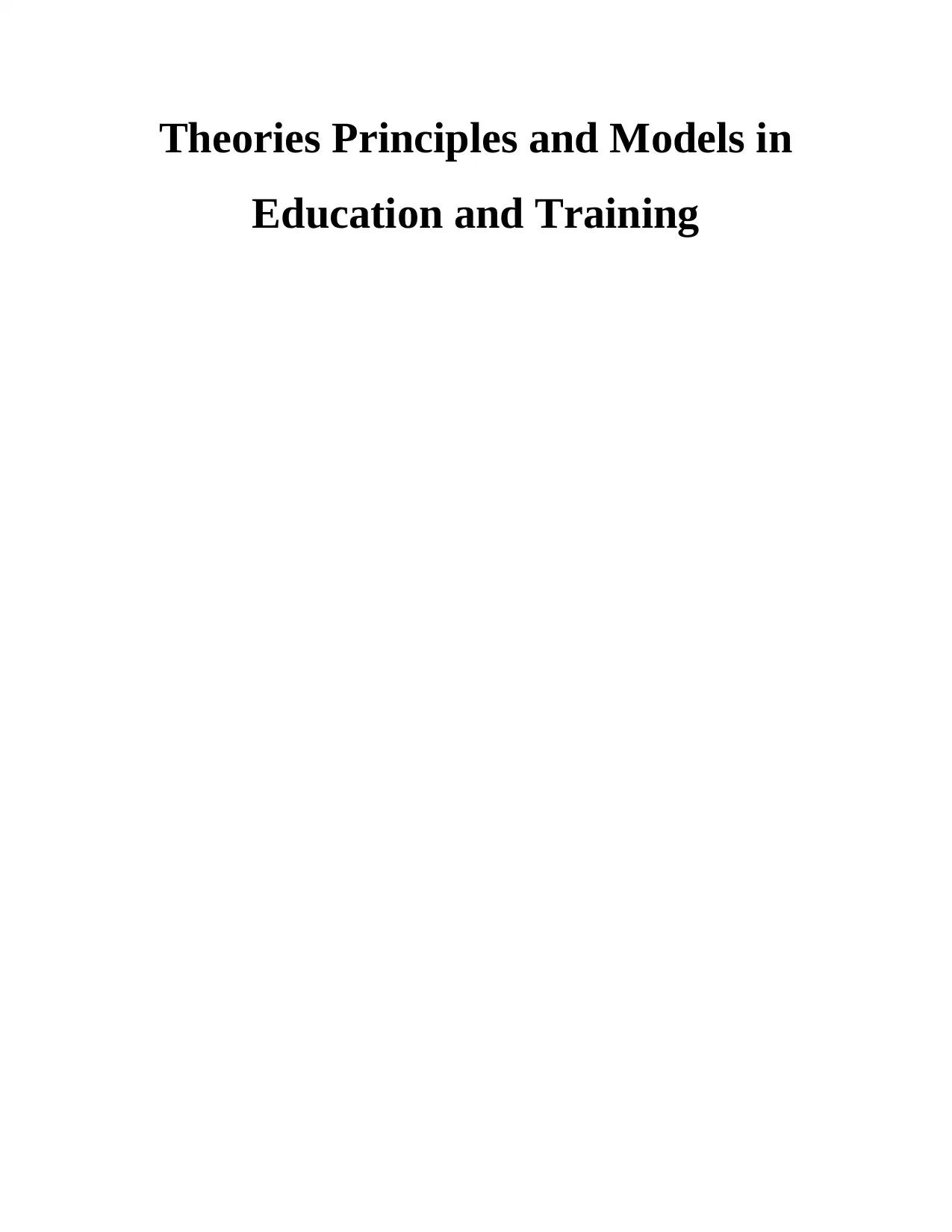
Theories Principles and Models in
Education and Training
Education and Training
Paraphrase This Document
Need a fresh take? Get an instant paraphrase of this document with our AI Paraphraser
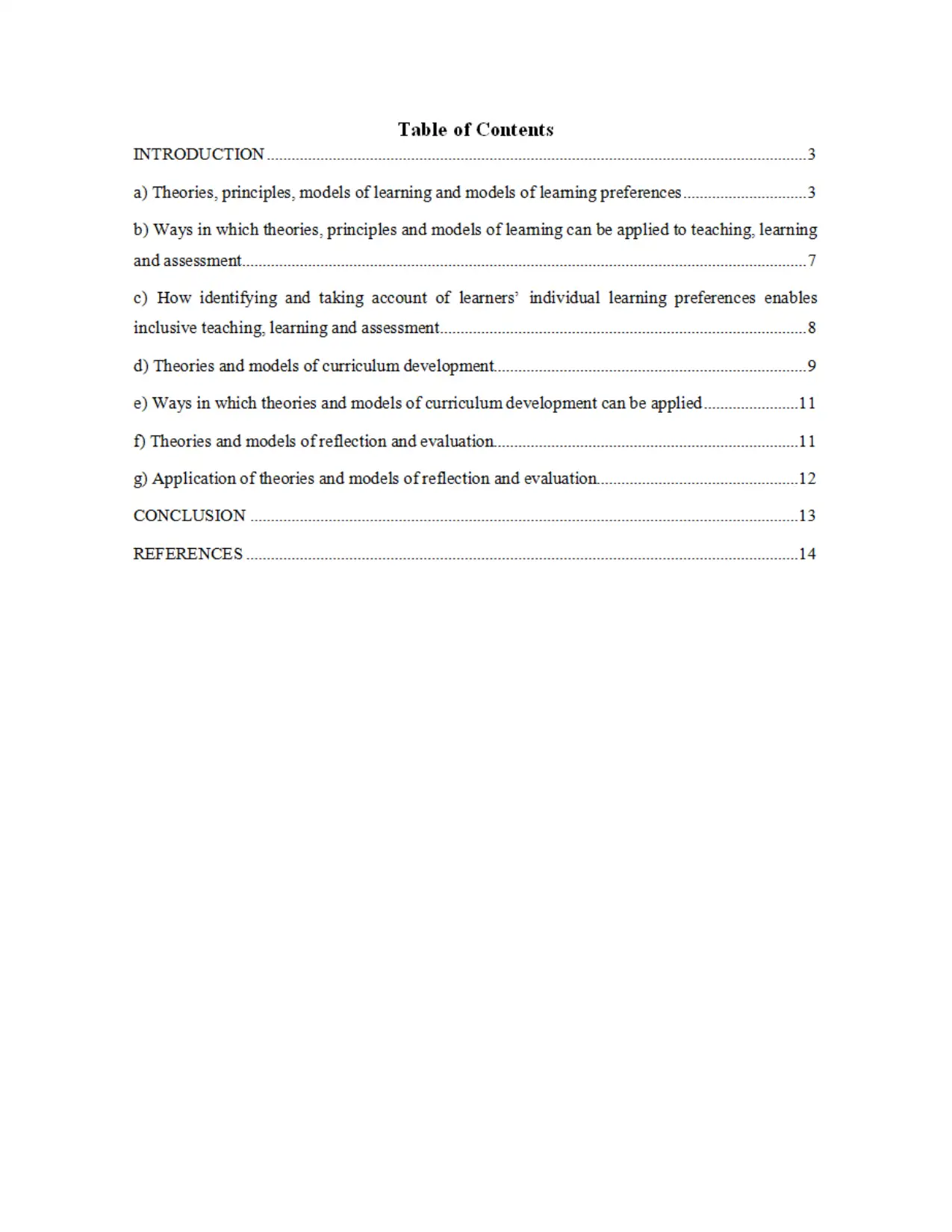
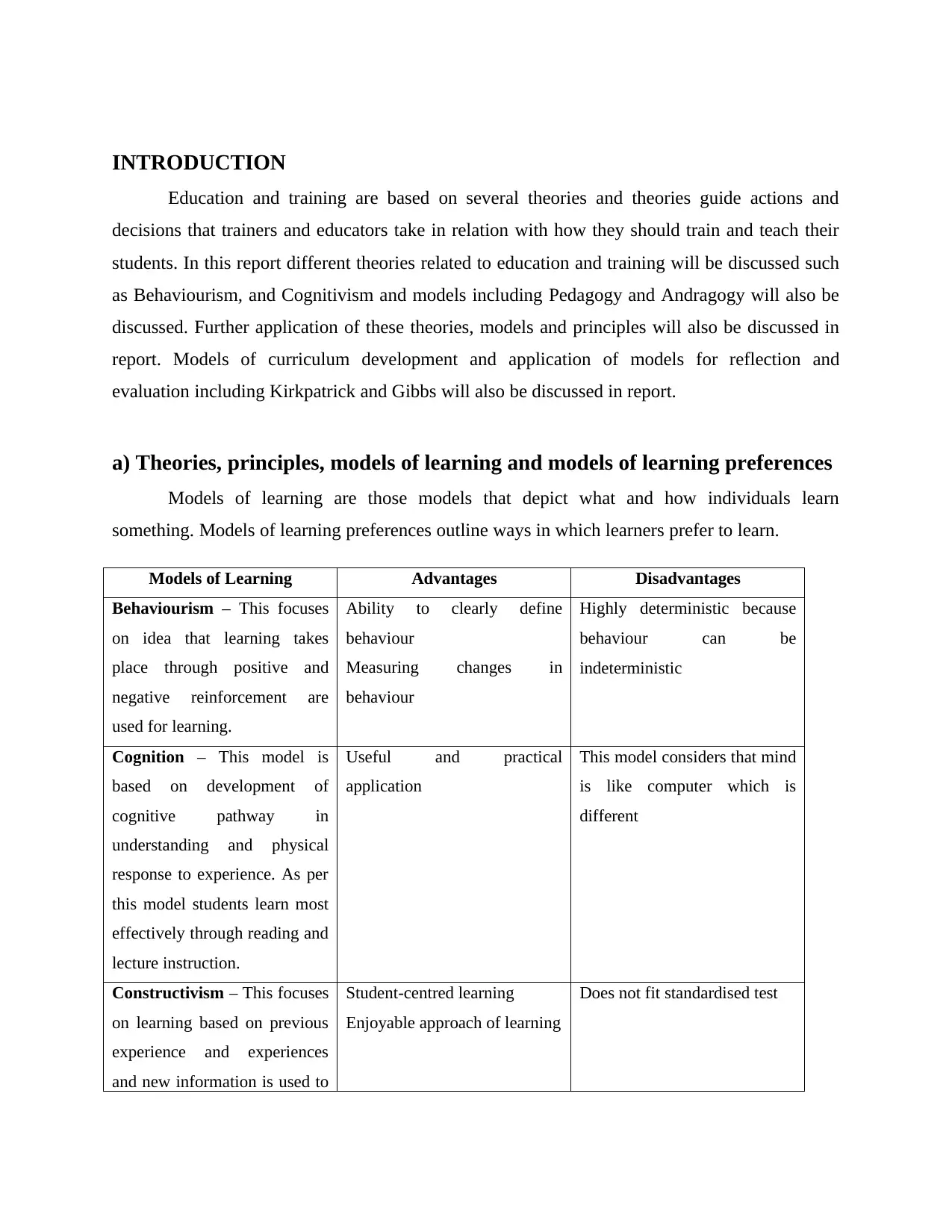
INTRODUCTION
Education and training are based on several theories and theories guide actions and
decisions that trainers and educators take in relation with how they should train and teach their
students. In this report different theories related to education and training will be discussed such
as Behaviourism, and Cognitivism and models including Pedagogy and Andragogy will also be
discussed. Further application of these theories, models and principles will also be discussed in
report. Models of curriculum development and application of models for reflection and
evaluation including Kirkpatrick and Gibbs will also be discussed in report.
a) Theories, principles, models of learning and models of learning preferences
Models of learning are those models that depict what and how individuals learn
something. Models of learning preferences outline ways in which learners prefer to learn.
Models of Learning Advantages Disadvantages
Behaviourism – This focuses
on idea that learning takes
place through positive and
negative reinforcement are
used for learning.
Ability to clearly define
behaviour
Measuring changes in
behaviour
Highly deterministic because
behaviour can be
indeterministic
Cognition – This model is
based on development of
cognitive pathway in
understanding and physical
response to experience. As per
this model students learn most
effectively through reading and
lecture instruction.
Useful and practical
application
This model considers that mind
is like computer which is
different
Constructivism – This focuses
on learning based on previous
experience and experiences
and new information is used to
Student-centred learning
Enjoyable approach of learning
Does not fit standardised test
Education and training are based on several theories and theories guide actions and
decisions that trainers and educators take in relation with how they should train and teach their
students. In this report different theories related to education and training will be discussed such
as Behaviourism, and Cognitivism and models including Pedagogy and Andragogy will also be
discussed. Further application of these theories, models and principles will also be discussed in
report. Models of curriculum development and application of models for reflection and
evaluation including Kirkpatrick and Gibbs will also be discussed in report.
a) Theories, principles, models of learning and models of learning preferences
Models of learning are those models that depict what and how individuals learn
something. Models of learning preferences outline ways in which learners prefer to learn.
Models of Learning Advantages Disadvantages
Behaviourism – This focuses
on idea that learning takes
place through positive and
negative reinforcement are
used for learning.
Ability to clearly define
behaviour
Measuring changes in
behaviour
Highly deterministic because
behaviour can be
indeterministic
Cognition – This model is
based on development of
cognitive pathway in
understanding and physical
response to experience. As per
this model students learn most
effectively through reading and
lecture instruction.
Useful and practical
application
This model considers that mind
is like computer which is
different
Constructivism – This focuses
on learning based on previous
experience and experiences
and new information is used to
Student-centred learning
Enjoyable approach of learning
Does not fit standardised test
⊘ This is a preview!⊘
Do you want full access?
Subscribe today to unlock all pages.

Trusted by 1+ million students worldwide
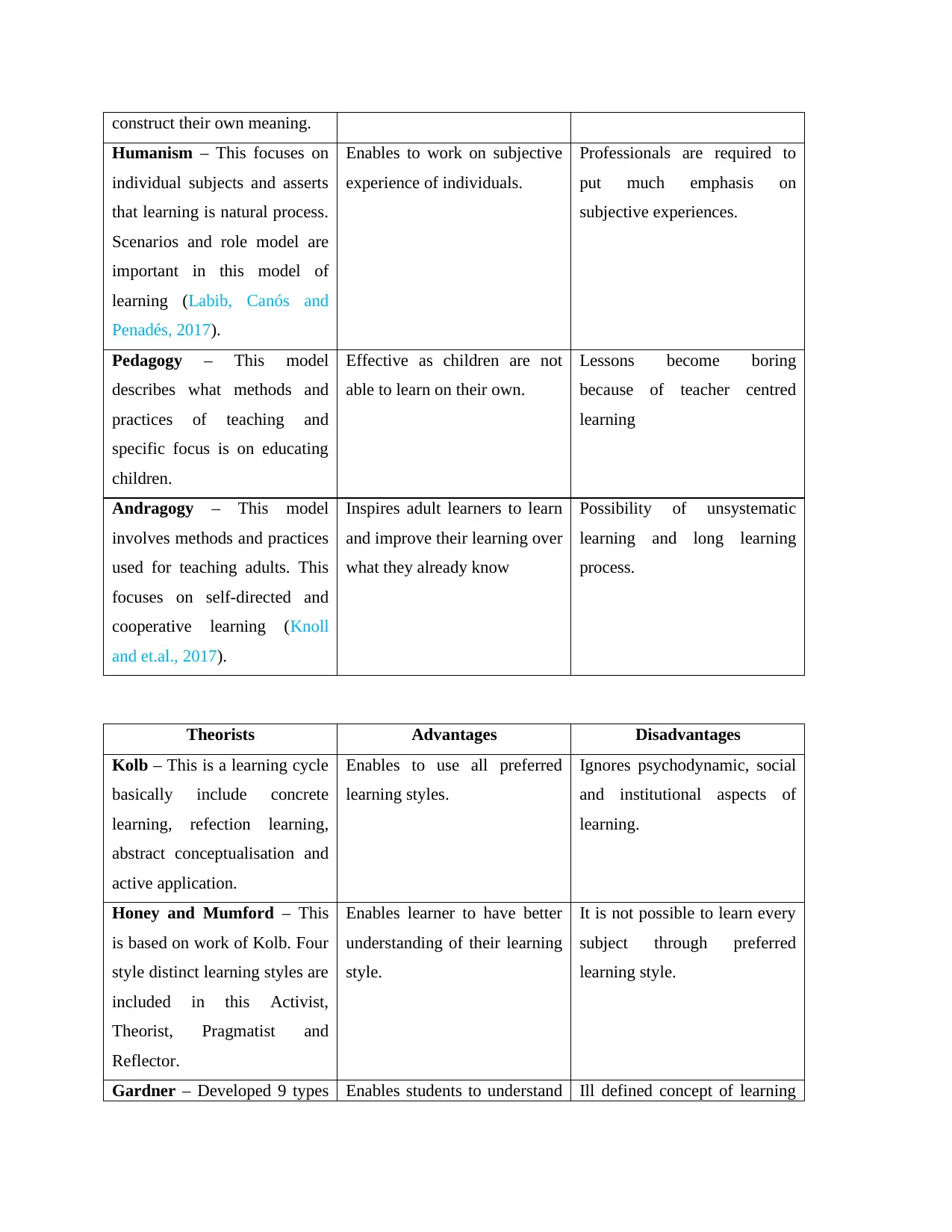
construct their own meaning.
Humanism – This focuses on
individual subjects and asserts
that learning is natural process.
Scenarios and role model are
important in this model of
learning (Labib, Canós and
Penadés, 2017).
Enables to work on subjective
experience of individuals.
Professionals are required to
put much emphasis on
subjective experiences.
Pedagogy – This model
describes what methods and
practices of teaching and
specific focus is on educating
children.
Effective as children are not
able to learn on their own.
Lessons become boring
because of teacher centred
learning
Andragogy – This model
involves methods and practices
used for teaching adults. This
focuses on self-directed and
cooperative learning (Knoll
and et.al., 2017).
Inspires adult learners to learn
and improve their learning over
what they already know
Possibility of unsystematic
learning and long learning
process.
Theorists Advantages Disadvantages
Kolb – This is a learning cycle
basically include concrete
learning, refection learning,
abstract conceptualisation and
active application.
Enables to use all preferred
learning styles.
Ignores psychodynamic, social
and institutional aspects of
learning.
Honey and Mumford – This
is based on work of Kolb. Four
style distinct learning styles are
included in this Activist,
Theorist, Pragmatist and
Reflector.
Enables learner to have better
understanding of their learning
style.
It is not possible to learn every
subject through preferred
learning style.
Gardner – Developed 9 types Enables students to understand Ill defined concept of learning
Humanism – This focuses on
individual subjects and asserts
that learning is natural process.
Scenarios and role model are
important in this model of
learning (Labib, Canós and
Penadés, 2017).
Enables to work on subjective
experience of individuals.
Professionals are required to
put much emphasis on
subjective experiences.
Pedagogy – This model
describes what methods and
practices of teaching and
specific focus is on educating
children.
Effective as children are not
able to learn on their own.
Lessons become boring
because of teacher centred
learning
Andragogy – This model
involves methods and practices
used for teaching adults. This
focuses on self-directed and
cooperative learning (Knoll
and et.al., 2017).
Inspires adult learners to learn
and improve their learning over
what they already know
Possibility of unsystematic
learning and long learning
process.
Theorists Advantages Disadvantages
Kolb – This is a learning cycle
basically include concrete
learning, refection learning,
abstract conceptualisation and
active application.
Enables to use all preferred
learning styles.
Ignores psychodynamic, social
and institutional aspects of
learning.
Honey and Mumford – This
is based on work of Kolb. Four
style distinct learning styles are
included in this Activist,
Theorist, Pragmatist and
Reflector.
Enables learner to have better
understanding of their learning
style.
It is not possible to learn every
subject through preferred
learning style.
Gardner – Developed 9 types Enables students to understand Ill defined concept of learning
Paraphrase This Document
Need a fresh take? Get an instant paraphrase of this document with our AI Paraphraser
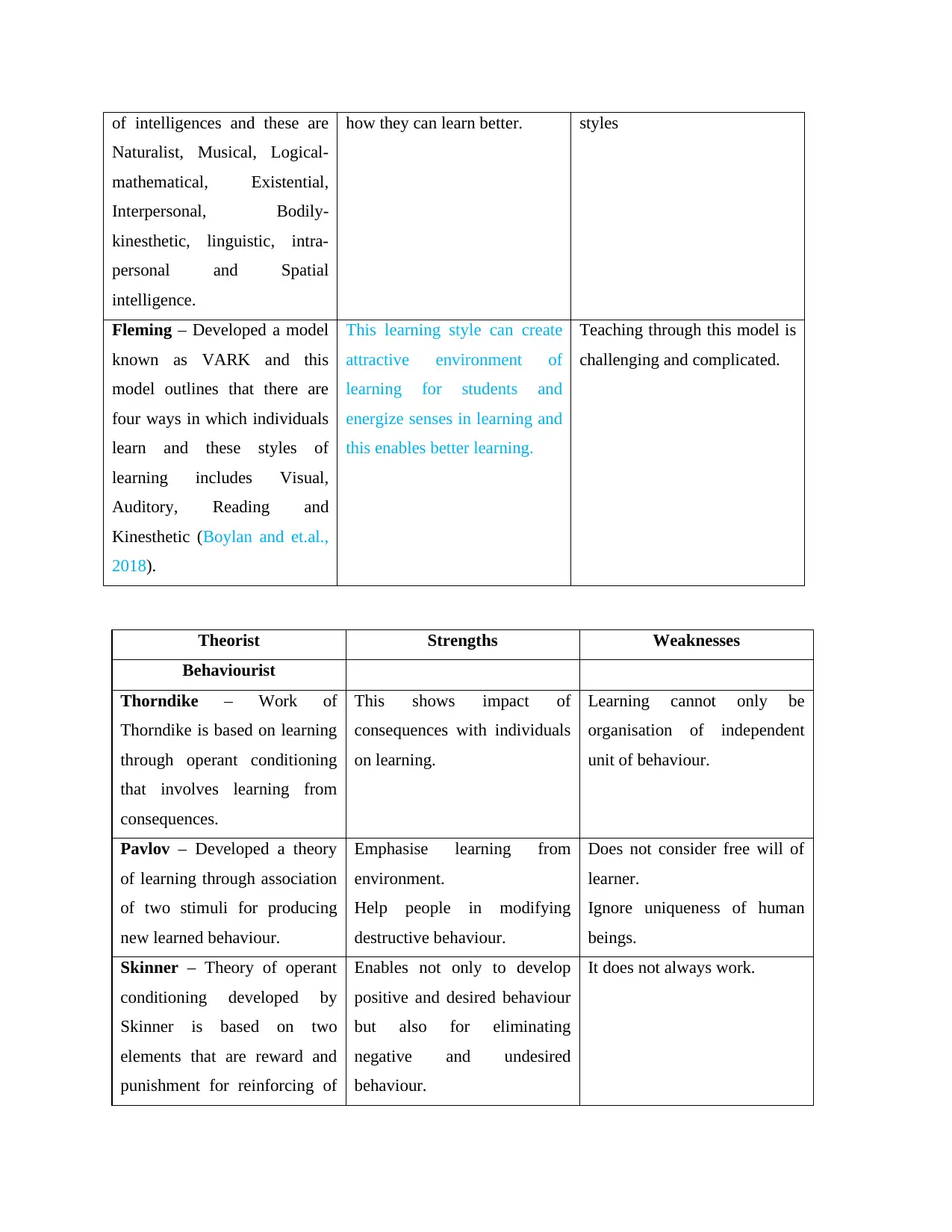
of intelligences and these are
Naturalist, Musical, Logical-
mathematical, Existential,
Interpersonal, Bodily-
kinesthetic, linguistic, intra-
personal and Spatial
intelligence.
how they can learn better. styles
Fleming – Developed a model
known as VARK and this
model outlines that there are
four ways in which individuals
learn and these styles of
learning includes Visual,
Auditory, Reading and
Kinesthetic (Boylan and et.al.,
2018).
This learning style can create
attractive environment of
learning for students and
energize senses in learning and
this enables better learning.
Teaching through this model is
challenging and complicated.
Theorist Strengths Weaknesses
Behaviourist
Thorndike – Work of
Thorndike is based on learning
through operant conditioning
that involves learning from
consequences.
This shows impact of
consequences with individuals
on learning.
Learning cannot only be
organisation of independent
unit of behaviour.
Pavlov – Developed a theory
of learning through association
of two stimuli for producing
new learned behaviour.
Emphasise learning from
environment.
Help people in modifying
destructive behaviour.
Does not consider free will of
learner.
Ignore uniqueness of human
beings.
Skinner – Theory of operant
conditioning developed by
Skinner is based on two
elements that are reward and
punishment for reinforcing of
Enables not only to develop
positive and desired behaviour
but also for eliminating
negative and undesired
behaviour.
It does not always work.
Naturalist, Musical, Logical-
mathematical, Existential,
Interpersonal, Bodily-
kinesthetic, linguistic, intra-
personal and Spatial
intelligence.
how they can learn better. styles
Fleming – Developed a model
known as VARK and this
model outlines that there are
four ways in which individuals
learn and these styles of
learning includes Visual,
Auditory, Reading and
Kinesthetic (Boylan and et.al.,
2018).
This learning style can create
attractive environment of
learning for students and
energize senses in learning and
this enables better learning.
Teaching through this model is
challenging and complicated.
Theorist Strengths Weaknesses
Behaviourist
Thorndike – Work of
Thorndike is based on learning
through operant conditioning
that involves learning from
consequences.
This shows impact of
consequences with individuals
on learning.
Learning cannot only be
organisation of independent
unit of behaviour.
Pavlov – Developed a theory
of learning through association
of two stimuli for producing
new learned behaviour.
Emphasise learning from
environment.
Help people in modifying
destructive behaviour.
Does not consider free will of
learner.
Ignore uniqueness of human
beings.
Skinner – Theory of operant
conditioning developed by
Skinner is based on two
elements that are reward and
punishment for reinforcing of
Enables not only to develop
positive and desired behaviour
but also for eliminating
negative and undesired
behaviour.
It does not always work.
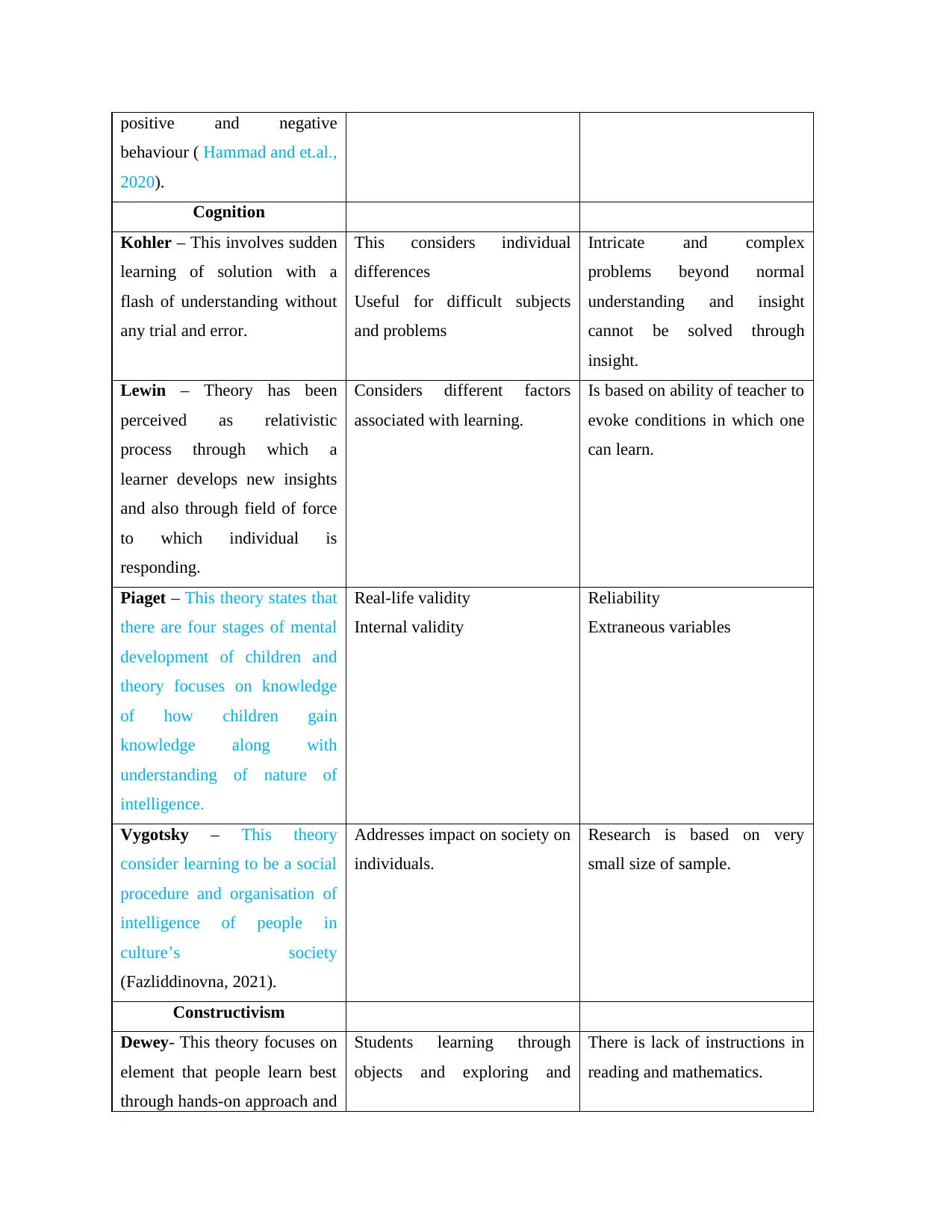
positive and negative
behaviour ( Hammad and et.al.,
2020).
Cognition
Kohler – This involves sudden
learning of solution with a
flash of understanding without
any trial and error.
This considers individual
differences
Useful for difficult subjects
and problems
Intricate and complex
problems beyond normal
understanding and insight
cannot be solved through
insight.
Lewin – Theory has been
perceived as relativistic
process through which a
learner develops new insights
and also through field of force
to which individual is
responding.
Considers different factors
associated with learning.
Is based on ability of teacher to
evoke conditions in which one
can learn.
Piaget – This theory states that
there are four stages of mental
development of children and
theory focuses on knowledge
of how children gain
knowledge along with
understanding of nature of
intelligence.
Real-life validity
Internal validity
Reliability
Extraneous variables
Vygotsky – This theory
consider learning to be a social
procedure and organisation of
intelligence of people in
culture’s society
(Fazliddinovna, 2021).
Addresses impact on society on
individuals.
Research is based on very
small size of sample.
Constructivism
Dewey- This theory focuses on
element that people learn best
through hands-on approach and
Students learning through
objects and exploring and
There is lack of instructions in
reading and mathematics.
behaviour ( Hammad and et.al.,
2020).
Cognition
Kohler – This involves sudden
learning of solution with a
flash of understanding without
any trial and error.
This considers individual
differences
Useful for difficult subjects
and problems
Intricate and complex
problems beyond normal
understanding and insight
cannot be solved through
insight.
Lewin – Theory has been
perceived as relativistic
process through which a
learner develops new insights
and also through field of force
to which individual is
responding.
Considers different factors
associated with learning.
Is based on ability of teacher to
evoke conditions in which one
can learn.
Piaget – This theory states that
there are four stages of mental
development of children and
theory focuses on knowledge
of how children gain
knowledge along with
understanding of nature of
intelligence.
Real-life validity
Internal validity
Reliability
Extraneous variables
Vygotsky – This theory
consider learning to be a social
procedure and organisation of
intelligence of people in
culture’s society
(Fazliddinovna, 2021).
Addresses impact on society on
individuals.
Research is based on very
small size of sample.
Constructivism
Dewey- This theory focuses on
element that people learn best
through hands-on approach and
Students learning through
objects and exploring and
There is lack of instructions in
reading and mathematics.
⊘ This is a preview!⊘
Do you want full access?
Subscribe today to unlock all pages.

Trusted by 1+ million students worldwide
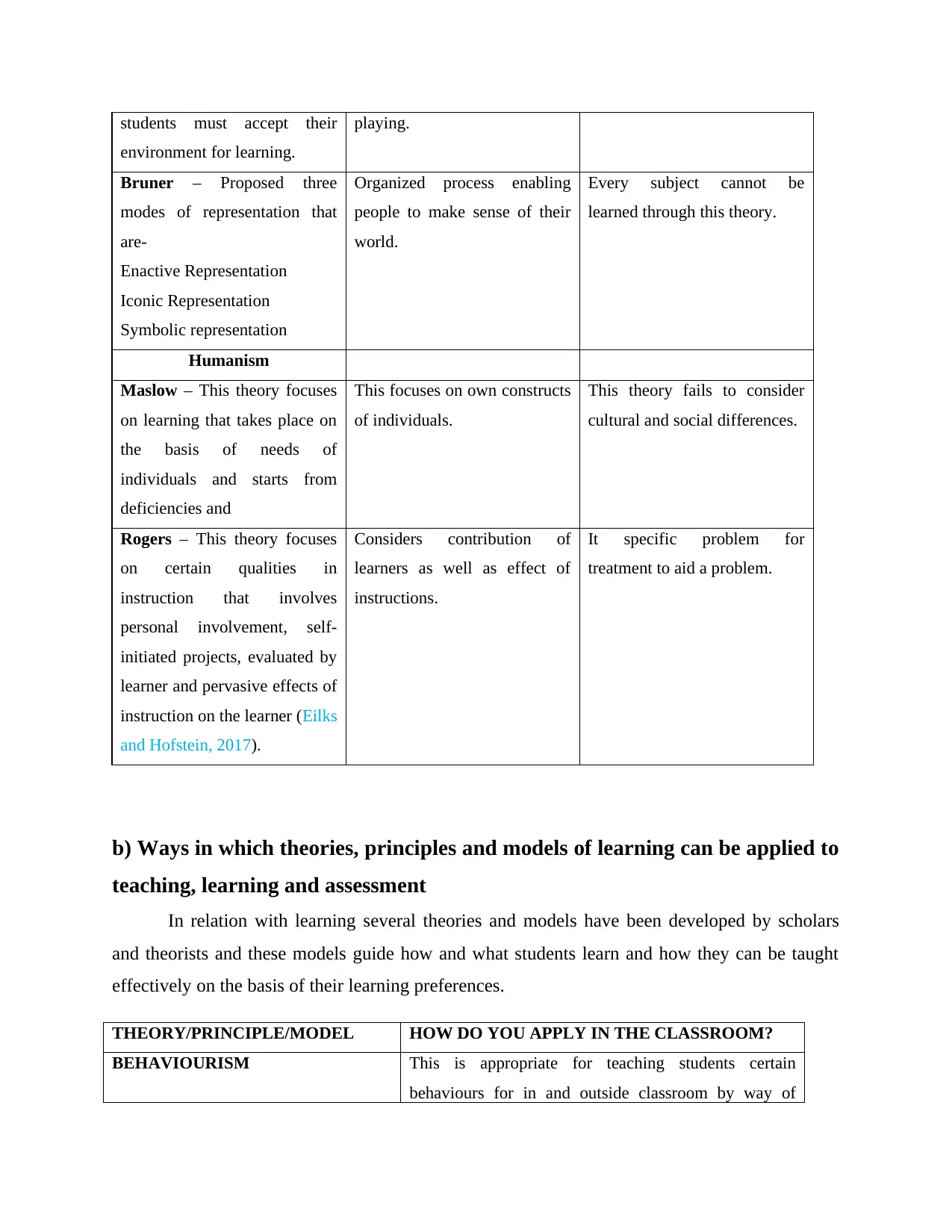
students must accept their
environment for learning.
playing.
Bruner – Proposed three
modes of representation that
are-
Enactive Representation
Iconic Representation
Symbolic representation
Organized process enabling
people to make sense of their
world.
Every subject cannot be
learned through this theory.
Humanism
Maslow – This theory focuses
on learning that takes place on
the basis of needs of
individuals and starts from
deficiencies and
This focuses on own constructs
of individuals.
This theory fails to consider
cultural and social differences.
Rogers – This theory focuses
on certain qualities in
instruction that involves
personal involvement, self-
initiated projects, evaluated by
learner and pervasive effects of
instruction on the learner (Eilks
and Hofstein, 2017).
Considers contribution of
learners as well as effect of
instructions.
It specific problem for
treatment to aid a problem.
b) Ways in which theories, principles and models of learning can be applied to
teaching, learning and assessment
In relation with learning several theories and models have been developed by scholars
and theorists and these models guide how and what students learn and how they can be taught
effectively on the basis of their learning preferences.
THEORY/PRINCIPLE/MODEL HOW DO YOU APPLY IN THE CLASSROOM?
BEHAVIOURISM This is appropriate for teaching students certain
behaviours for in and outside classroom by way of
environment for learning.
playing.
Bruner – Proposed three
modes of representation that
are-
Enactive Representation
Iconic Representation
Symbolic representation
Organized process enabling
people to make sense of their
world.
Every subject cannot be
learned through this theory.
Humanism
Maslow – This theory focuses
on learning that takes place on
the basis of needs of
individuals and starts from
deficiencies and
This focuses on own constructs
of individuals.
This theory fails to consider
cultural and social differences.
Rogers – This theory focuses
on certain qualities in
instruction that involves
personal involvement, self-
initiated projects, evaluated by
learner and pervasive effects of
instruction on the learner (Eilks
and Hofstein, 2017).
Considers contribution of
learners as well as effect of
instructions.
It specific problem for
treatment to aid a problem.
b) Ways in which theories, principles and models of learning can be applied to
teaching, learning and assessment
In relation with learning several theories and models have been developed by scholars
and theorists and these models guide how and what students learn and how they can be taught
effectively on the basis of their learning preferences.
THEORY/PRINCIPLE/MODEL HOW DO YOU APPLY IN THE CLASSROOM?
BEHAVIOURISM This is appropriate for teaching students certain
behaviours for in and outside classroom by way of
Paraphrase This Document
Need a fresh take? Get an instant paraphrase of this document with our AI Paraphraser
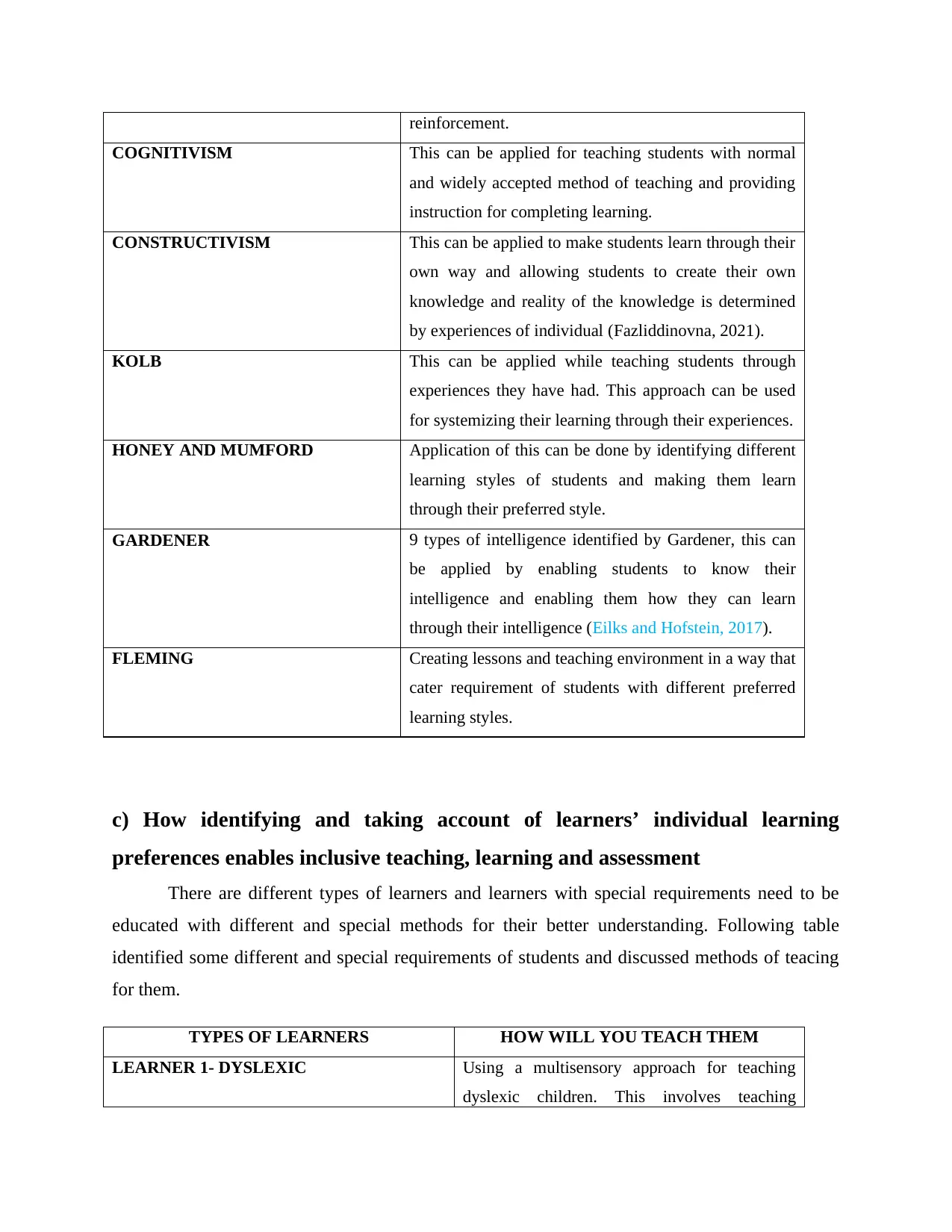
reinforcement.
COGNITIVISM This can be applied for teaching students with normal
and widely accepted method of teaching and providing
instruction for completing learning.
CONSTRUCTIVISM This can be applied to make students learn through their
own way and allowing students to create their own
knowledge and reality of the knowledge is determined
by experiences of individual (Fazliddinovna, 2021).
KOLB This can be applied while teaching students through
experiences they have had. This approach can be used
for systemizing their learning through their experiences.
HONEY AND MUMFORD Application of this can be done by identifying different
learning styles of students and making them learn
through their preferred style.
GARDENER 9 types of intelligence identified by Gardener, this can
be applied by enabling students to know their
intelligence and enabling them how they can learn
through their intelligence (Eilks and Hofstein, 2017).
FLEMING Creating lessons and teaching environment in a way that
cater requirement of students with different preferred
learning styles.
c) How identifying and taking account of learners’ individual learning
preferences enables inclusive teaching, learning and assessment
There are different types of learners and learners with special requirements need to be
educated with different and special methods for their better understanding. Following table
identified some different and special requirements of students and discussed methods of teacing
for them.
TYPES OF LEARNERS HOW WILL YOU TEACH THEM
LEARNER 1- DYSLEXIC Using a multisensory approach for teaching
dyslexic children. This involves teaching
COGNITIVISM This can be applied for teaching students with normal
and widely accepted method of teaching and providing
instruction for completing learning.
CONSTRUCTIVISM This can be applied to make students learn through their
own way and allowing students to create their own
knowledge and reality of the knowledge is determined
by experiences of individual (Fazliddinovna, 2021).
KOLB This can be applied while teaching students through
experiences they have had. This approach can be used
for systemizing their learning through their experiences.
HONEY AND MUMFORD Application of this can be done by identifying different
learning styles of students and making them learn
through their preferred style.
GARDENER 9 types of intelligence identified by Gardener, this can
be applied by enabling students to know their
intelligence and enabling them how they can learn
through their intelligence (Eilks and Hofstein, 2017).
FLEMING Creating lessons and teaching environment in a way that
cater requirement of students with different preferred
learning styles.
c) How identifying and taking account of learners’ individual learning
preferences enables inclusive teaching, learning and assessment
There are different types of learners and learners with special requirements need to be
educated with different and special methods for their better understanding. Following table
identified some different and special requirements of students and discussed methods of teacing
for them.
TYPES OF LEARNERS HOW WILL YOU TEACH THEM
LEARNER 1- DYSLEXIC Using a multisensory approach for teaching
dyslexic children. This involves teaching
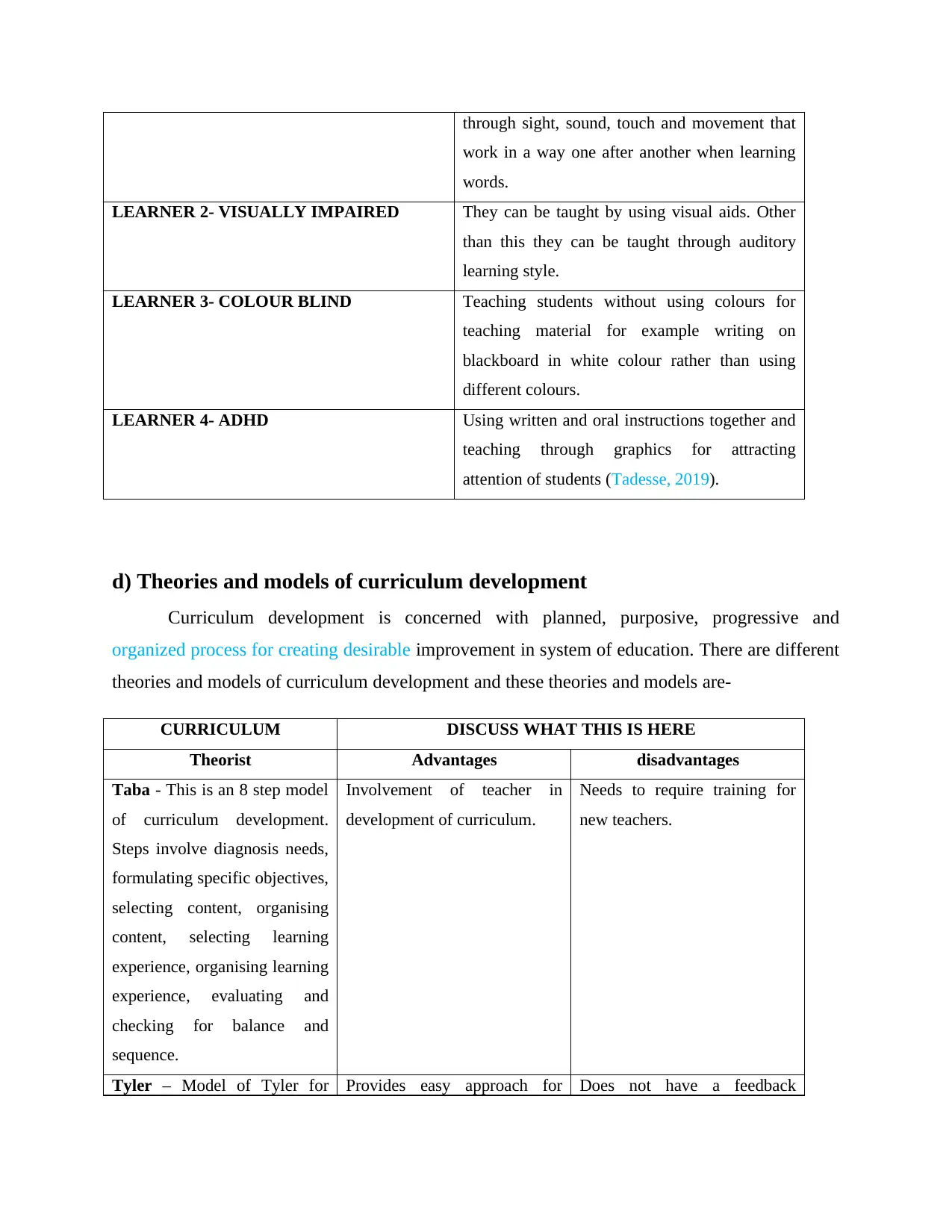
through sight, sound, touch and movement that
work in a way one after another when learning
words.
LEARNER 2- VISUALLY IMPAIRED They can be taught by using visual aids. Other
than this they can be taught through auditory
learning style.
LEARNER 3- COLOUR BLIND Teaching students without using colours for
teaching material for example writing on
blackboard in white colour rather than using
different colours.
LEARNER 4- ADHD Using written and oral instructions together and
teaching through graphics for attracting
attention of students (Tadesse, 2019).
d) Theories and models of curriculum development
Curriculum development is concerned with planned, purposive, progressive and
organized process for creating desirable improvement in system of education. There are different
theories and models of curriculum development and these theories and models are-
CURRICULUM DISCUSS WHAT THIS IS HERE
Theorist Advantages disadvantages
Taba - This is an 8 step model
of curriculum development.
Steps involve diagnosis needs,
formulating specific objectives,
selecting content, organising
content, selecting learning
experience, organising learning
experience, evaluating and
checking for balance and
sequence.
Involvement of teacher in
development of curriculum.
Needs to require training for
new teachers.
Tyler – Model of Tyler for Provides easy approach for Does not have a feedback
work in a way one after another when learning
words.
LEARNER 2- VISUALLY IMPAIRED They can be taught by using visual aids. Other
than this they can be taught through auditory
learning style.
LEARNER 3- COLOUR BLIND Teaching students without using colours for
teaching material for example writing on
blackboard in white colour rather than using
different colours.
LEARNER 4- ADHD Using written and oral instructions together and
teaching through graphics for attracting
attention of students (Tadesse, 2019).
d) Theories and models of curriculum development
Curriculum development is concerned with planned, purposive, progressive and
organized process for creating desirable improvement in system of education. There are different
theories and models of curriculum development and these theories and models are-
CURRICULUM DISCUSS WHAT THIS IS HERE
Theorist Advantages disadvantages
Taba - This is an 8 step model
of curriculum development.
Steps involve diagnosis needs,
formulating specific objectives,
selecting content, organising
content, selecting learning
experience, organising learning
experience, evaluating and
checking for balance and
sequence.
Involvement of teacher in
development of curriculum.
Needs to require training for
new teachers.
Tyler – Model of Tyler for Provides easy approach for Does not have a feedback
⊘ This is a preview!⊘
Do you want full access?
Subscribe today to unlock all pages.

Trusted by 1+ million students worldwide
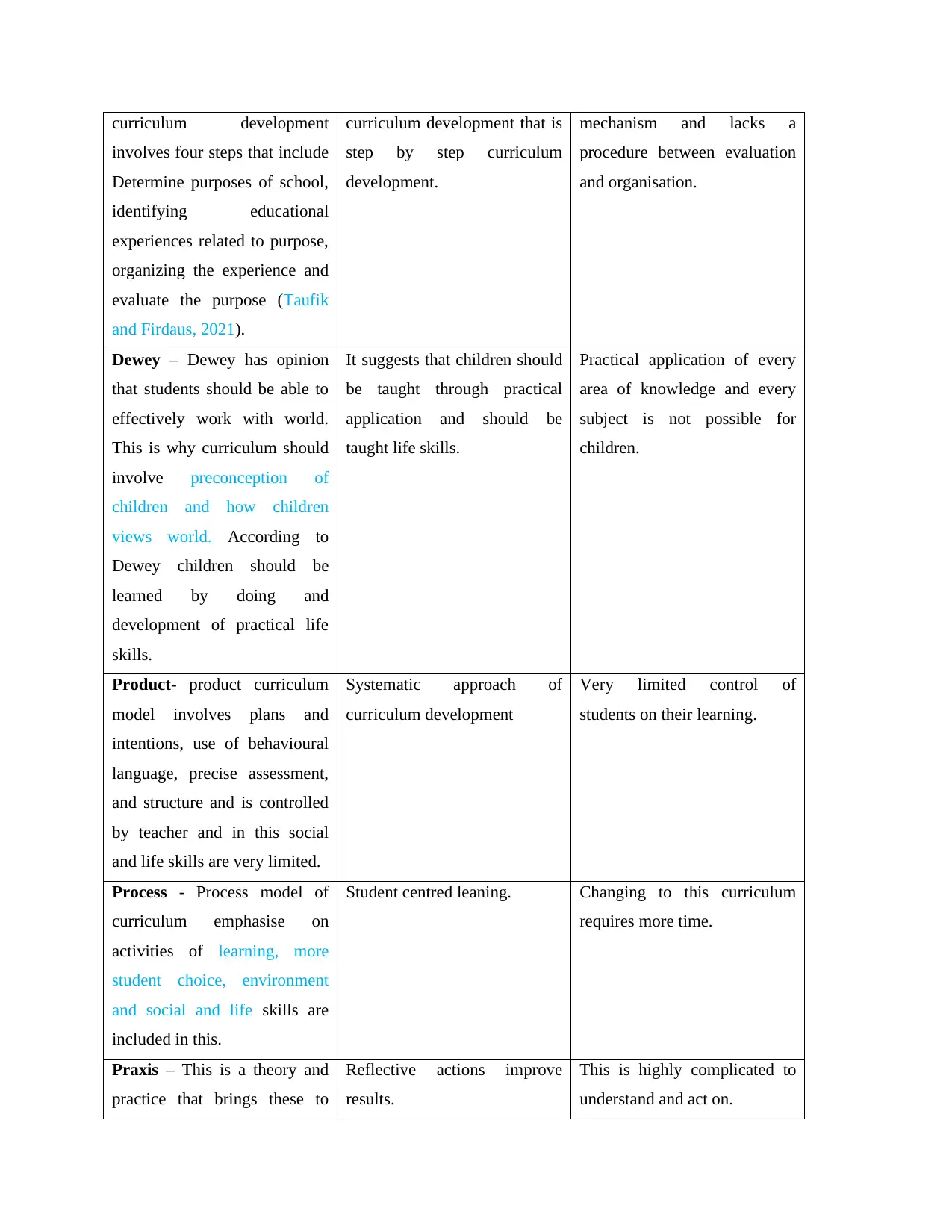
curriculum development
involves four steps that include
Determine purposes of school,
identifying educational
experiences related to purpose,
organizing the experience and
evaluate the purpose (Taufik
and Firdaus, 2021).
curriculum development that is
step by step curriculum
development.
mechanism and lacks a
procedure between evaluation
and organisation.
Dewey – Dewey has opinion
that students should be able to
effectively work with world.
This is why curriculum should
involve preconception of
children and how children
views world. According to
Dewey children should be
learned by doing and
development of practical life
skills.
It suggests that children should
be taught through practical
application and should be
taught life skills.
Practical application of every
area of knowledge and every
subject is not possible for
children.
Product- product curriculum
model involves plans and
intentions, use of behavioural
language, precise assessment,
and structure and is controlled
by teacher and in this social
and life skills are very limited.
Systematic approach of
curriculum development
Very limited control of
students on their learning.
Process - Process model of
curriculum emphasise on
activities of learning, more
student choice, environment
and social and life skills are
included in this.
Student centred leaning. Changing to this curriculum
requires more time.
Praxis – This is a theory and
practice that brings these to
Reflective actions improve
results.
This is highly complicated to
understand and act on.
involves four steps that include
Determine purposes of school,
identifying educational
experiences related to purpose,
organizing the experience and
evaluate the purpose (Taufik
and Firdaus, 2021).
curriculum development that is
step by step curriculum
development.
mechanism and lacks a
procedure between evaluation
and organisation.
Dewey – Dewey has opinion
that students should be able to
effectively work with world.
This is why curriculum should
involve preconception of
children and how children
views world. According to
Dewey children should be
learned by doing and
development of practical life
skills.
It suggests that children should
be taught through practical
application and should be
taught life skills.
Practical application of every
area of knowledge and every
subject is not possible for
children.
Product- product curriculum
model involves plans and
intentions, use of behavioural
language, precise assessment,
and structure and is controlled
by teacher and in this social
and life skills are very limited.
Systematic approach of
curriculum development
Very limited control of
students on their learning.
Process - Process model of
curriculum emphasise on
activities of learning, more
student choice, environment
and social and life skills are
included in this.
Student centred leaning. Changing to this curriculum
requires more time.
Praxis – This is a theory and
practice that brings these to
Reflective actions improve
results.
This is highly complicated to
understand and act on.
Paraphrase This Document
Need a fresh take? Get an instant paraphrase of this document with our AI Paraphraser
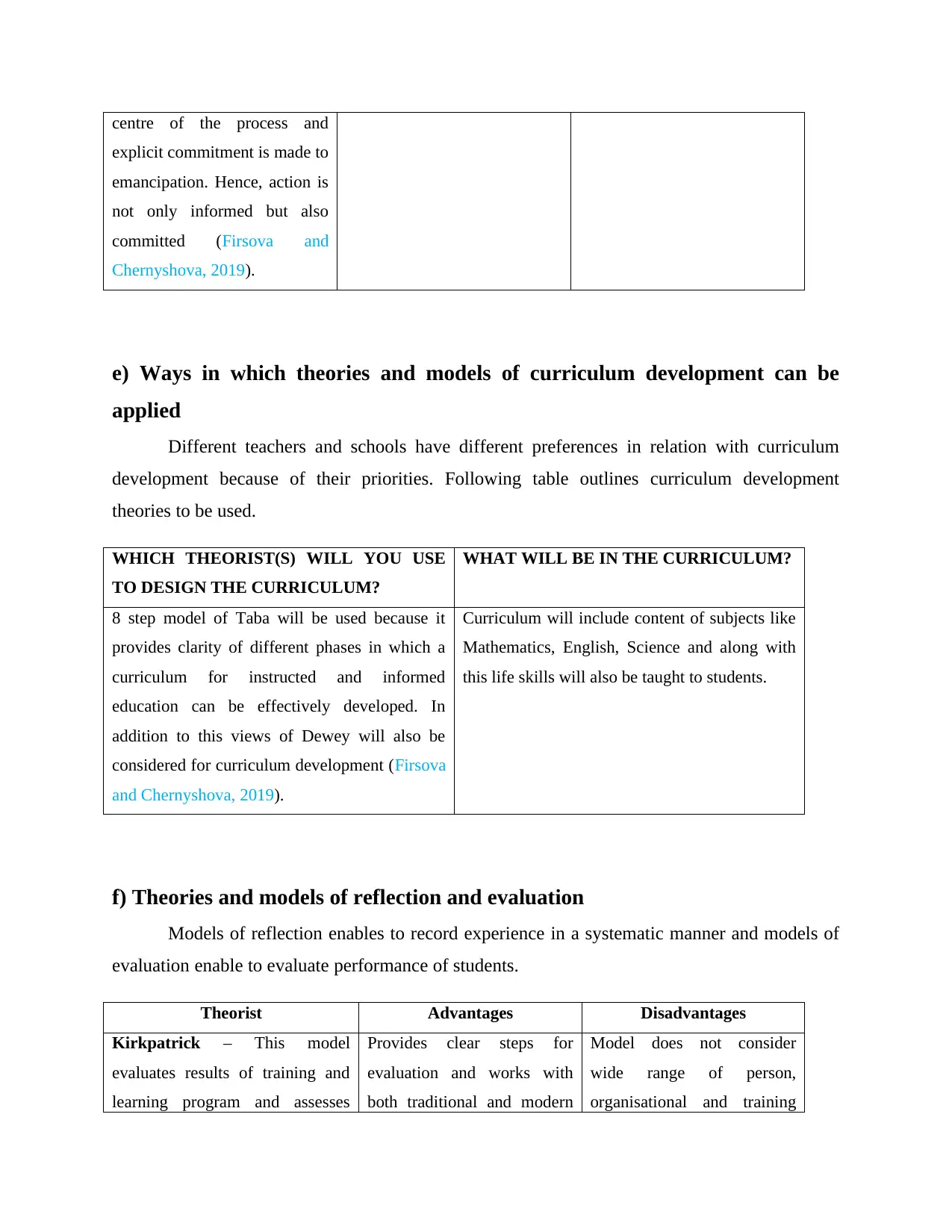
centre of the process and
explicit commitment is made to
emancipation. Hence, action is
not only informed but also
committed (Firsova and
Chernyshova, 2019).
e) Ways in which theories and models of curriculum development can be
applied
Different teachers and schools have different preferences in relation with curriculum
development because of their priorities. Following table outlines curriculum development
theories to be used.
WHICH THEORIST(S) WILL YOU USE
TO DESIGN THE CURRICULUM?
WHAT WILL BE IN THE CURRICULUM?
8 step model of Taba will be used because it
provides clarity of different phases in which a
curriculum for instructed and informed
education can be effectively developed. In
addition to this views of Dewey will also be
considered for curriculum development (Firsova
and Chernyshova, 2019).
Curriculum will include content of subjects like
Mathematics, English, Science and along with
this life skills will also be taught to students.
f) Theories and models of reflection and evaluation
Models of reflection enables to record experience in a systematic manner and models of
evaluation enable to evaluate performance of students.
Theorist Advantages Disadvantages
Kirkpatrick – This model
evaluates results of training and
learning program and assesses
Provides clear steps for
evaluation and works with
both traditional and modern
Model does not consider
wide range of person,
organisational and training
explicit commitment is made to
emancipation. Hence, action is
not only informed but also
committed (Firsova and
Chernyshova, 2019).
e) Ways in which theories and models of curriculum development can be
applied
Different teachers and schools have different preferences in relation with curriculum
development because of their priorities. Following table outlines curriculum development
theories to be used.
WHICH THEORIST(S) WILL YOU USE
TO DESIGN THE CURRICULUM?
WHAT WILL BE IN THE CURRICULUM?
8 step model of Taba will be used because it
provides clarity of different phases in which a
curriculum for instructed and informed
education can be effectively developed. In
addition to this views of Dewey will also be
considered for curriculum development (Firsova
and Chernyshova, 2019).
Curriculum will include content of subjects like
Mathematics, English, Science and along with
this life skills will also be taught to students.
f) Theories and models of reflection and evaluation
Models of reflection enables to record experience in a systematic manner and models of
evaluation enable to evaluate performance of students.
Theorist Advantages Disadvantages
Kirkpatrick – This model
evaluates results of training and
learning program and assesses
Provides clear steps for
evaluation and works with
both traditional and modern
Model does not consider
wide range of person,
organisational and training
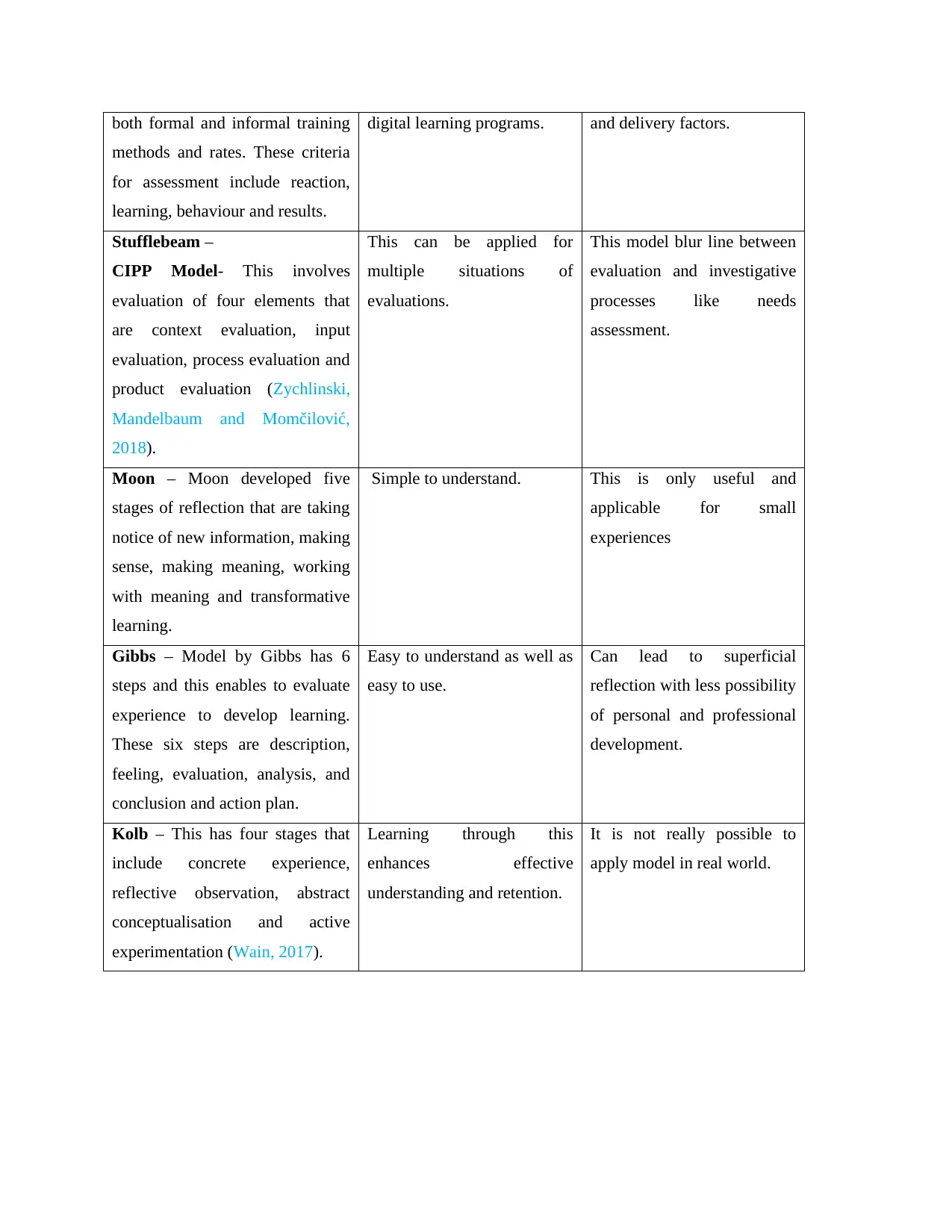
both formal and informal training
methods and rates. These criteria
for assessment include reaction,
learning, behaviour and results.
digital learning programs. and delivery factors.
Stufflebeam –
CIPP Model- This involves
evaluation of four elements that
are context evaluation, input
evaluation, process evaluation and
product evaluation (Zychlinski,
Mandelbaum and Momčilović,
2018).
This can be applied for
multiple situations of
evaluations.
This model blur line between
evaluation and investigative
processes like needs
assessment.
Moon – Moon developed five
stages of reflection that are taking
notice of new information, making
sense, making meaning, working
with meaning and transformative
learning.
Simple to understand. This is only useful and
applicable for small
experiences
Gibbs – Model by Gibbs has 6
steps and this enables to evaluate
experience to develop learning.
These six steps are description,
feeling, evaluation, analysis, and
conclusion and action plan.
Easy to understand as well as
easy to use.
Can lead to superficial
reflection with less possibility
of personal and professional
development.
Kolb – This has four stages that
include concrete experience,
reflective observation, abstract
conceptualisation and active
experimentation (Wain, 2017).
Learning through this
enhances effective
understanding and retention.
It is not really possible to
apply model in real world.
methods and rates. These criteria
for assessment include reaction,
learning, behaviour and results.
digital learning programs. and delivery factors.
Stufflebeam –
CIPP Model- This involves
evaluation of four elements that
are context evaluation, input
evaluation, process evaluation and
product evaluation (Zychlinski,
Mandelbaum and Momčilović,
2018).
This can be applied for
multiple situations of
evaluations.
This model blur line between
evaluation and investigative
processes like needs
assessment.
Moon – Moon developed five
stages of reflection that are taking
notice of new information, making
sense, making meaning, working
with meaning and transformative
learning.
Simple to understand. This is only useful and
applicable for small
experiences
Gibbs – Model by Gibbs has 6
steps and this enables to evaluate
experience to develop learning.
These six steps are description,
feeling, evaluation, analysis, and
conclusion and action plan.
Easy to understand as well as
easy to use.
Can lead to superficial
reflection with less possibility
of personal and professional
development.
Kolb – This has four stages that
include concrete experience,
reflective observation, abstract
conceptualisation and active
experimentation (Wain, 2017).
Learning through this
enhances effective
understanding and retention.
It is not really possible to
apply model in real world.
⊘ This is a preview!⊘
Do you want full access?
Subscribe today to unlock all pages.

Trusted by 1+ million students worldwide
1 out of 14
Related Documents
Your All-in-One AI-Powered Toolkit for Academic Success.
+13062052269
info@desklib.com
Available 24*7 on WhatsApp / Email
![[object Object]](/_next/static/media/star-bottom.7253800d.svg)
Unlock your academic potential
Copyright © 2020–2026 A2Z Services. All Rights Reserved. Developed and managed by ZUCOL.



